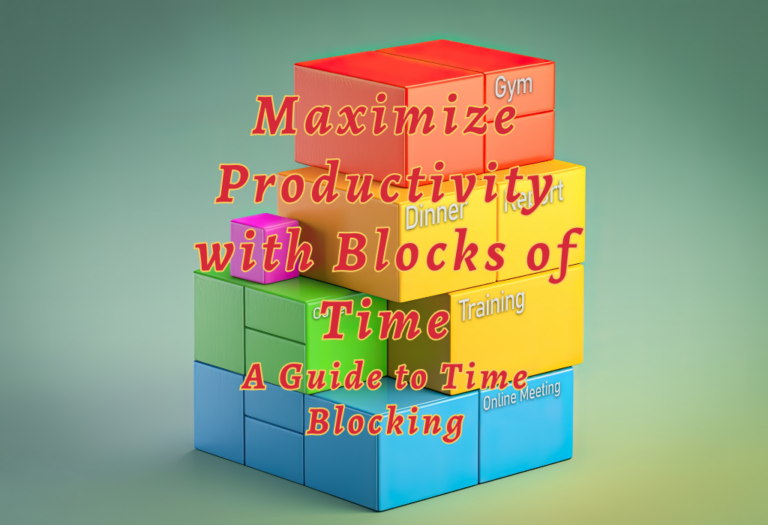Unlock Your Potential: Master the Technique of Time Management
Time management is an essential skill for entrepreneurs and professionals to master to be successful. With the right technique of time management, you can effectively optimize your schedule, increase productivity, and ultimately live a more fulfilling life.
In this blog post, we will explore how establishing goals, scheduling wisely, utilizing technology as well as delegating tasks; are all key components that will help you improve performance while managing stress levels.
Additionally, learn how optimizing meetings and staying motivated can contribute to improved efficiency with the technique of time management.

What is Time Management?
Time management is the practice of organizing and planning how to divide your time between specific activities. It helps you make the most out of your day, increase productivity, and reach goals faster. With effective time management skills, you can accomplish more in less time and free up hours for leisure or personal pursuits.
Effective Time Management Techniques
Time management is essential for busy professionals, entrepreneurs, and freelancers. To optimize your schedule and increase productivity, there are a few techniques you can use.
Establishing goals is an essential part of time management for busy professionals. Identifying your priorities helps you focus on the tasks that are most important to you and your business. Start by making a list of all the things you need to accomplish to reach your desired outcome. Consider both short-term and long-term objectives, as well as any potential obstacles that may arise along the way.
Prioritizing these tasks can be difficult, but it’s important to determine which ones should take precedence over others. Ask yourself questions such as “What needs to get done first?” or “Which task will have the greatest impact on my success?” Once you have identified what is most important, make sure those items are at the top of your list and allocate more time towards them than other less pressing tasks.
It’s also important to set realistic objectives when establishing goals for yourself or your business. Break down large projects into smaller achievable tasks so they don’t seem overwhelming or impossible from the start. Estimate how much time each task will take so that you can plan accordingly and adjust if needed later on to stay on track with deadlines or other commitments.
Once all of this has been established, create a plan of action outlining exactly what steps need to be taken for each goal/task/project, etc., to be completed successfully within its designated timeframe. This could include breaking down larger projects into smaller chunks with specific deadlines attached; setting reminders throughout the day; delegating certain responsibilities; scheduling meetings etc. Make sure everything is written down somewhere so there’s no confusion about what needs doing and when – this will help keep everyone accountable while ensuring nothing gets overlooked or forgotten about.
Establishing goals is essential to effective time management. Once you have identified your priorities, set realistic objectives, and created a plan of action, it’s time to move on to the next step: Scheduling Time Wisely.
Scheduling Time Wisely
Scheduling time wisely is essential for effective time management. Making the most of your day, allocating time for important tasks, and avoiding procrastination and distractions are all key elements of this process. It’s important to create a schedule that allows you to focus on the tasks that are most important and prioritize them accordingly.
Start by creating a daily plan with realistic goals in mind. Break down large projects into smaller chunks so they’re easier to manage, and set aside specific blocks of time for each task or activity. Prioritize tasks based on their importance or urgency, as well as any deadlines associated with them. Make sure to include breaks throughout the day so you can stay focused and energized while working on more demanding tasks.
When it comes to managing your workload efficiently, it’s important to allocate enough time for completing priority tasks first before moving on to less urgent ones later in the day or week if necessary. This will help ensure that you don’t miss any deadlines due to a lack of planning or mismanagement of resources such as personnel or materials needed for the completion of certain activities within an allotted timeframe.
By effectively scheduling time and utilizing technology, you can maximize productivity and make the most of each day. Moving on to Utilizing Technology to Manage Time Effectively, let’s explore how technology can help us manage our time more efficiently.
Utilizing Technology to Manage Time Effectively
Technology has revolutionized the way we manage our time. By leveraging automation tools and apps, professionals can streamline processes and save valuable time. Automation tools can be used to automate mundane tasks such as scheduling emails or creating reports, freeing up more of your time for other important tasks. Additionally, project management software is a great tool for tracking progress and deadlines on projects. This helps ensure that you stay on track with your goals while also helping you better prioritize tasks throughout the day.
Cloud-based solutions are also an invaluable resource when it comes to managing time effectively. These solutions allow teams to collaborate in real time from any location around the world, making communication much faster and easier than ever before. Additionally, cloud-based services make it easy to store data securely so that it can be accessed anytime from anywhere without having to worry about losing important documents or files due to hardware malfunctions or other issues.
Overall, utilizing technology is key when it comes to managing your time efficiently and achieving success in today’s fast-paced business environment. Automation tools help streamline processes while project management software helps keep track of progress and deadlines on projects; cloud-based solutions enable teams to collaborate quickly no matter where they are located. All these technologies combined provide a powerful suite of resources that will help busy professionals optimize their schedules and increase productivity levels significantly over time.
By leveraging automation tools and apps, utilizing project management software, and taking advantage of cloud-based solutions, you can effectively manage your time to maximize productivity. Now let’s look at how delegation and outsourcing tasks can help improve productivity.
Improving Productivity Through Delegation and Outsourcing Tasks
Do you feel overwhelmed with the amount of work that needs to be done? Are you struggling to keep up with your deadlines and feeling like there’s just not enough time in the day? If so, it may be time for you to consider delegating or outsourcing some of your tasks. Delegation and outsourcing can help improve productivity by freeing up more of your time so that you can focus on higher-value activities.
a. Identifying Areas Where You Can Outsource Work:
Before delegating any tasks, it’s important to identify which areas are best suited for delegation or outsourcing. Consider which tasks take up a lot of your time but don’t require a high level of expertise from yourself. These could include administrative tasks such as bookkeeping, customer service inquiries, data entry, etc. Once these areas have been identified, then it’s time to start looking for someone qualified and experienced in those particular fields.
b. Finding the Right People To Delegate Tasks To:
When searching for people who are qualified and experienced in certain fields, look at their credentials and experience carefully before making any decisions about hiring them on a freelance basis or full-time basis depending on what works best for both parties involved. It’s also important to make sure they understand exactly what type of task they will be responsible for completing as well as how much responsibility they will have over the project itself before signing an agreement with them if necessary.
By delegating and outsourcing tasks, you can free up your time to focus on other areas of your business. This will help improve productivity and efficiency while reducing stress levels. Next, we’ll look at how managing stress levels can help you stay focused and perform better.
Managing Stress Levels to Improve Focus and Performance
Stress is a natural part of life, but it can have a detrimental effect on productivity and focus if not managed properly. Practicing mindfulness techniques is one way to reduce stress levels and improve focus. Mindfulness involves focusing on the present moment without judgment or expectation, allowing you to take a step back from your thoughts and feelings so that they don’t become overwhelming. This could involve taking time out for meditation or yoga, or simply engaging in activities such as walking in nature that help you to be more mindful of your surroundings.
Taking regular breaks throughout the day can also help manage stress levels by providing an opportunity for relaxation and rejuvenation. Taking short walks outside, listening to music, reading a book or magazine, and talking with friends or colleagues—all these activities provide relief from work-related stressors while still allowing you to remain productive during the day.
Developing healthy habits for self-care is another important component of managing stress levels effectively. Eating nutritious meals regularly throughout the day helps maintain energy levels while avoiding unhealthy snacks like sugary treats which can lead to spikes in blood sugar followed by crashes later on. Getting enough sleep each night also helps restore mental clarity and alertness during waking hours; aim for at least seven hours per night if possible. Finally, exercising regularly boosts endorphins which help combat fatigue while reducing anxiety associated with stressful situations at work or home
Managing stress levels is key to improving focus and performance, and by taking the right steps such as practicing mindfulness techniques, taking breaks throughout the day, and developing healthy habits for self-care, you can set yourself up for success. Next, we’ll look at optimizing meetings for maximum efficiency.
Optimizing Meetings for Maximum Efficiency
Optimizing meetings is essential for busy professionals to ensure maximum efficiency when it comes to getting things done quickly without sacrificing quality or accuracy. Preparing an agenda in advance helps keep the meeting on track and ensures that all topics are discussed thoroughly. It also allows attendees to come prepared with any questions or comments they may have about the topic at hand. Limiting meeting attendees can help streamline conversations and avoid distractions from those who do not need to be present. This will allow more time for discussion of important topics and a better use of everyone’s time. Keeping discussions on topic is also key, as this prevents unnecessary tangents that could potentially derail the entire conversation and waste valuable time. If necessary, set a timer so that everyone knows how much time they have left for each topic before moving on to the next one. By following these simple steps, you can optimize your meetings for maximum efficiency while still ensuring productivity remains high.
Optimizing meetings for maximum efficiency is key to making the most of your time. With the right preparation and focus, you can keep discussions on topic and maximize productivity. Now let’s look at how to stay motivated to achieve your goals.
Eliminate Distractions
Distractions can be the bane of any professional’s existence. Whether it’s social media, web browsing, co-workers, text messages, or instant messaging, they can all add up to a huge time suck and prevent you from getting your work done.
The key to personal time management is being proactive about eliminating distractions. Start by shutting your door if possible – this will help limit interruptions from co-workers and other people in the office. Close all tabs on your computer except for those that are related to the task at hand; this will help keep you focused on what needs to be done instead of wandering off into other areas online. Turn off notifications for messaging apps such as WhatsApp or Slack so that incoming messages don’t distract you from completing tasks quickly and efficiently. If possible, leave personal phone calls until lunchtime when there won’t be as much pressure to finish tasks quickly and effectively.
If these steps seem too daunting at first, start small by identifying two of your biggest distractions and focusing on conquering them over two weeks before moving on to others. Don’t forget that getting enough sleep, drinking plenty of water throughout the day, and eating healthily can also go a long way towards helping you stay focused during work hours – especially when that afternoon slump hits.
Staying Motivated
Staying motivated is essential for effective time management and productivity. Celebrating small wins can help keep motivation levels high, even when fatigue or other external factors such as lack of recognition or reward from peers or superiors may be present.
Achieving goals, no matter how small they are, should be celebrated to maintain motivation. This could include completing a task on time, meeting a deadline, learning something new, etc. These small successes should be acknowledged and rewarded with something that brings joy and satisfaction like taking a break to watch an episode of your favorite show or going out for dinner with friends. This will help you stay motivated and focused on the bigger picture.
Connecting with peers who share similar objectives can be an effective way to stay motivated and reach success faster. Joining professional networks online provides access to experienced professionals in the same field, giving valuable insight into how best to approach any given situation while maintaining motivation. Furthermore, having support from peers during difficult times as well as celebrating successes together creates positive reinforcement for all involved parties.
FAQs about Technique of Time Management
Conclusion
It requires discipline, focus, and dedication to develop the technique of time management that works best for you. By establishing goals, scheduling your time wisely, utilizing technology effectively, delegating tasks when possible, managing stress levels, and optimizing meetings for maximum efficiency you can stay motivated and productive in your work. With practice and perseverance, you will be able to maximize productivity while still having a fulfilling life outside of work.
Are you struggling with time management and feeling overwhelmed by your daily tasks? Schedulemakeover.com can help! With our Time Management expert tips and tools, we’ll guide you through optimizing your schedule to increase productivity, manage projects more effectively, boost business success, and ultimately lead a happier life. Don’t wait any longer – visit us today for the best advice on how to get organized and make the most of your day!





